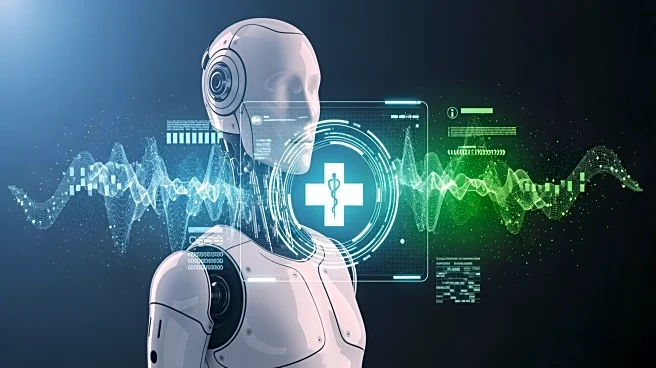What's Happening?
Artificial intelligence tools like ChatGPT, Gemini, and Grok are increasingly being used by patients for self-diagnosis, leading to a phenomenon known as cyberchondria. This trend, while providing quick access to medical information, is causing challenges
for healthcare professionals. Patients often arrive at medical consultations with preconceived notions about their health conditions, complicating the doctor-patient relationship. A panel of doctors, including Dr. Raymond Dominic and Dr. A Ashok Kumar, discussed the implications of this trend, noting that while AI can provide basic health information, it cannot replace professional medical judgment. The ease of access to information is leading to anxiety and misinterpretation, with some patients delaying professional consultations based on AI-generated advice.
Why It's Important?
The rise of AI self-diagnosis tools has significant implications for the healthcare industry. While these tools empower patients with information, they also risk increasing anxiety and misinformation. This can lead to unnecessary medical consultations, burdening healthcare systems, or worse, delaying necessary medical intervention. The trend highlights the need for digital literacy in healthcare, ensuring that both patients and doctors can responsibly use AI tools. The potential for AI to misinterpret symptoms and provide misleading information underscores the importance of professional medical advice. As AI becomes more integrated into healthcare, balancing information access with medical judgment is crucial to maintaining trust and efficacy in medical treatments.
What's Next?
Moving forward, there is a need for increased digital literacy among both patients and healthcare providers. Patients should be educated on how to use AI tools responsibly, understanding their limitations and the importance of consulting healthcare professionals. Healthcare providers may need to adapt by incorporating AI into their practices while ensuring that it complements rather than replaces professional judgment. There is also a call for AI tools to be trained on diverse datasets that reflect local healthcare contexts, reducing the risk of misinformation. As AI continues to evolve, its role in healthcare will likely expand, necessitating ongoing dialogue and adaptation within the medical community.
Beyond the Headlines
The ethical implications of AI in healthcare are profound. The potential for AI to influence patient behavior and decision-making raises questions about accountability and the role of technology in personal health. There is also a cultural dimension, as AI tools often rely on data from Western healthcare systems, which may not be applicable in other contexts. This highlights the need for culturally sensitive AI applications that consider local health practices and demographics. The integration of AI in healthcare also prompts discussions about data privacy and the security of personal health information, as more patients turn to digital platforms for health advice.















